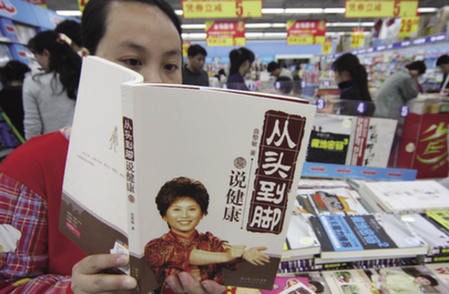|
Professor Yi was sued by readers for 50 mistakes in his books, and when professor Yu Dan attended a signing session in a bookstore, a man protested by wearing a T-shirt emblazoned with the words, "Confucius is worried and Master Zhuang angry." Things of the Ming Dynasty was listed as a 2008 Bad Book, and it was regarded as a non-nutritional multi-vitamin. But it still enjoyed great popularity. Many reviewers said reading reinterpreted classics was like chewing gum that others had already chewed. In other words, it was worse than eating leftovers. But against the backdrop of modern fast food culture, an enthusiastic response from the market was to be expected.
Traditional Chinese Medicine
Qu Limin, an associate professor at Beijing University of Chinese Medicine, published a few books about health, but drew little attention. The situation changed in July 2008, when she published Health from Head to Toe, which was listed as a number one seller in many bookstores and on the Internet.
 |
|
A woman peruses a book on healthy living in a bookstore during the National Day holiday in 2008. |
Qu's advice included eating good meals, resting, doing more exercise, and not being angry. She analyzed common health problems, from disease symptoms to pathogens, as well as ways of preventing diseases.
Qu is not the only one to have gained fame from the popularity of preventive medicine. The first was Wu Qingzhong from Taiwan, author of Guide to Using Your Body. Although not a professional doctor, Wu used plain language to introduce the system of traditional medicine and how to prevent common diseases. Sales of 500,000 copies led to him publishing another book in 2008, The Body Recovery Project.
Shortages of medical resources result in many problems for patients, like the difficulty of getting a bed in a hospital and the high cost of treatment. Health preservation books provide a potential solution. Better Depend on Yourself Than Ask for Help from Doctors, a bestseller in 2007, was released by Jiangsu Literature and Art Publishing House. This book has now been published in a third edition, with the slogan, "The best way to improve China's health condition."
Now books like Guide to Using Your Body have become gifts given by bosses to their staff, in order to show their concern for their employees' health. Talking about her book, Qu said we should "not take pills at random, and we should trust that our bodies are cleverer than our minds." Many traditional medical practitioners admit that the popularity of these titles has created a broader market for traditional medicines.
----------------------------------------------
Chinese Reading Rate
China publishes more than 300,000 titles every year, making it the world’s biggest book producing country. The nation also has about 250 million netizens who are not used to reading paper anymore. According to a survey by the China Institute of Publishing Science in July 2008, the Chinese reading rate (the percentage of people who frequently read books against the entire population) was 48.8 percent, compared to 60.4 in 1999, 51.7 in 2003 and 48.7 in 2005. Meanwhile, the Internet reading rate climbed quickly to 44.9 percent, increasing from 3.7 in 1999, 18.3 in 2003 and 27.8 in 2005. In 2007, Chinese people purchased an average of five books per capita, 80 percent of which were textbooks. Among interviewees who didn’t read, 43.7 percent of them said the reason was “lack of time.” Among those who were not used to reading books, 45.9 percent were aged 18-19. |
